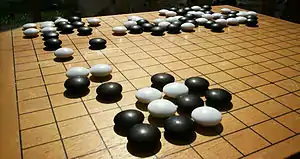Portal:China/Selected article/2006/June
Go (board game), also known as Weiqi in Mandarin Chinese (Chinese: 圍棋; Chinese: 围棋), and Baduk in Korean (Hangul:바둑), is a strategic, deterministic two-player board game originating in ancient China, before 200 BC. The game is now popular throughout East Asia and on the Internet. The object of the game is to place stones so they control a larger board territory than one's opponent, while preventing them from being surrounded and captured by the opponent.

The English name Go originated from the Japanese pronunciation "go" of the Chinese characters 棋/碁; in Japanese the name is written 碁. The Chinese name Weiqi roughly translates as "encirclement chess", the "board game of surrounding", or the "enclosing game". Its ancient Chinese name is 弈 (Chinese: yì). The writings 棋/碁 are variants, as seen in the Chinese Kangxi dictionary. The game is most commonly known as 囲碁 (igo) in Japanese. (Read more...)
This article was the Selected Article from May 2005 to June 2006.